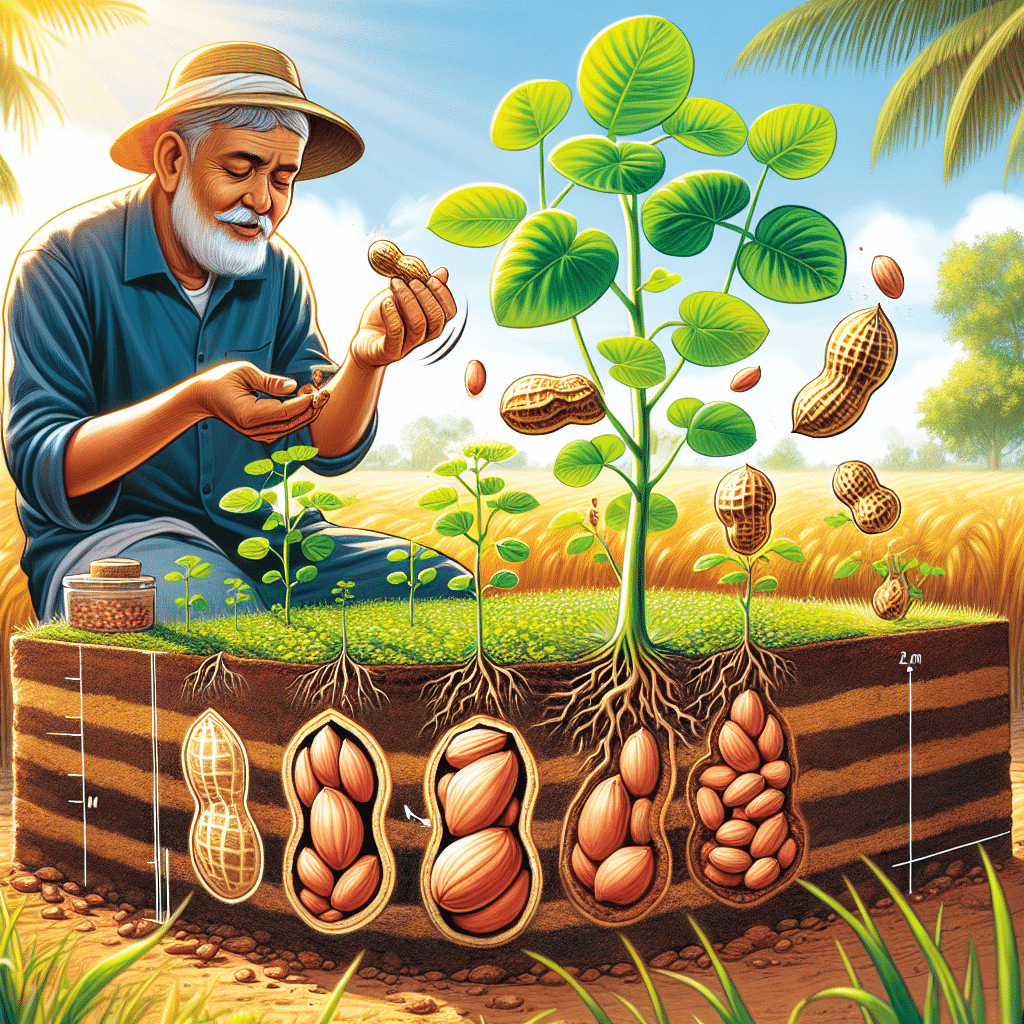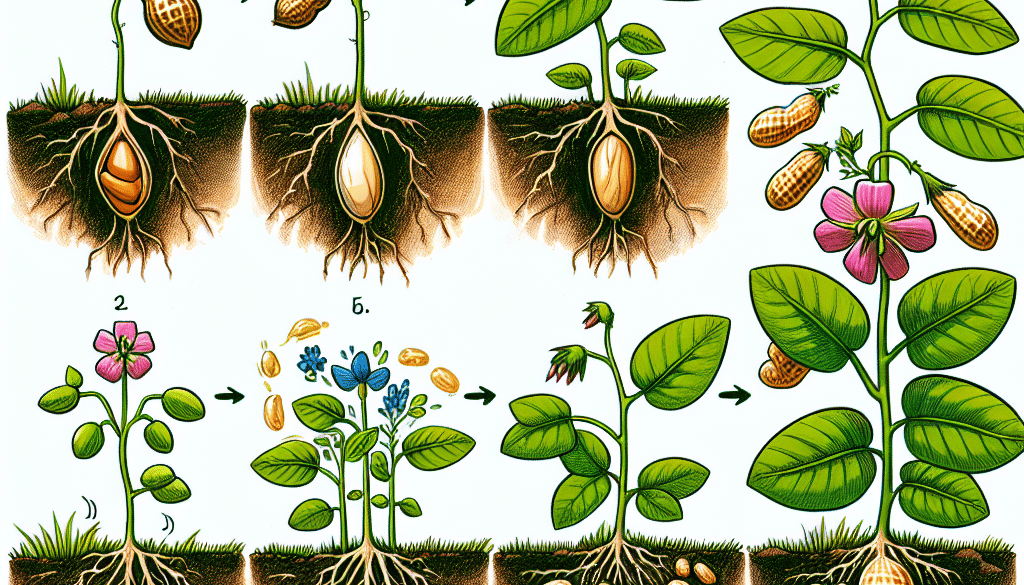Peanut Growth: Sprouting Nutty Success
-
Table of Contents
- Peanut Growth: Cultivating a Nutty Success Story
- The Lifecycle of a Peanut Plant
- Optimal Growing Conditions for Peanuts
- Challenges in Peanut Cultivation
- Innovations in Peanut Farming
- Case Studies: Success Stories in Peanut Production
- Global Impact of Peanut Production
- Conclusion: Harvesting the Fruits of Labor
- Discover the Power of Peanuts with ETprotein
Peanut Growth: Cultivating a Nutty Success Story

Peanuts, also known as groundnuts, are a staple in diets around the world, revered not only for their nutritional value but also for their versatility in various culinary applications. From peanut butter to snack nuts and oil production, the humble peanut plays a significant role in global agriculture and economy. Understanding the intricacies of peanut growth is essential for farmers and agricultural professionals aiming to maximize yield and quality. This article delves into the journey of peanut cultivation, from planting to harvest, and the factors that contribute to a successful peanut crop.
The Lifecycle of a Peanut Plant
The growth of a peanut plant is a fascinating process that begins with the selection of quality seeds and ends with the harvest of mature peanuts. Here’s an overview of the lifecycle stages:
- Seed Selection: Choosing high-quality, disease-free seeds is crucial for a healthy crop.
- Germination: Peanut seeds sprout when soil temperatures reach about 65-70°F (18-21°C).
- Vegetative Growth: The plant develops leaves and stems, focusing on building a strong root system.
- Flowering: Peanut plants produce yellow flowers that self-pollinate, leading to the next stage.
- Pegging: After pollination, the flower’s ovary elongates and grows downward, penetrating the soil.
- Pod Development: The peanut pods mature underground over several months.
- Harvesting: Once the peanuts are mature, they are dug up, dried, and prepared for market.
Optimal Growing Conditions for Peanuts
To achieve a bountiful peanut harvest, certain environmental conditions must be met:
- Soil Type: Well-drained, sandy loam soils are ideal for peanut cultivation.
- Temperature: Warm climates with temperatures between 70-95°F (21-35°C) are necessary for growth.
- Water Requirements: Peanuts need consistent moisture, especially during the pegging and pod development stages.
- Sunlight: Full sun exposure is essential for the energy needs of a growing peanut plant.
Challenges in Peanut Cultivation
Despite their resilience, peanuts face several challenges that can impact growth and yield:
- Pests and Diseases: Insects like the peanut worm and diseases such as leaf spot can damage crops.
- Weed Competition: Weeds can outcompete peanut plants for nutrients and water.
- Climate Variability: Extreme weather events can disrupt the delicate growth cycle of peanuts.
Innovations in Peanut Farming
Advancements in agricultural technology and practices have led to increased efficiency and yield in peanut farming:
- Precision Agriculture: GPS and data analytics help optimize planting and harvesting.
- Improved Seed Varieties: Research has led to the development of more resilient and productive peanut strains.
- Sustainable Practices: Crop rotation and organic farming techniques enhance soil health and reduce environmental impact.
Case Studies: Success Stories in Peanut Production
Several countries have made significant strides in peanut production through innovative approaches:
- United States: The adoption of precision farming techniques has led to higher yields and reduced waste.
- China: Investment in research and development has resulted in improved peanut varieties suited to local conditions.
- India: Smallholder farmers have increased productivity by utilizing better irrigation and pest management practices.
Global Impact of Peanut Production
The peanut industry has a substantial economic and nutritional impact worldwide:
- Economic Value: Peanuts contribute significantly to the GDP of many developing countries.
- Nutritional Benefits: Peanuts are a rich source of protein, healthy fats, and essential vitamins and minerals.
- Food Security: As a legume, peanuts improve soil fertility, making them an important crop for sustainable agriculture.
Conclusion: Harvesting the Fruits of Labor
The journey from peanut planting to harvest is a testament to the dedication and innovation of farmers worldwide. By understanding the growth process and overcoming cultivation challenges, the agricultural community continues to ensure that peanuts remain a reliable and nutritious food source. The success stories and statistics highlight the potential for even greater achievements in peanut production, with the promise of nutty success sprouting in fields across the globe.
Discover the Power of Peanuts with ETprotein
If you’re inspired by the potential of peanuts and looking to incorporate high-quality protein into your products, ETprotein offers a range of exceptional protein solutions. Their peanut protein, along with other plant-based proteins, is perfect for enhancing the nutritional profile of your offerings. With ETprotein’s commitment to non-GMO, allergen-free ingredients, you can trust that you’re providing your customers with the best. Explore their products and elevate your brand with the power of plant protein.
About ETprotein:
ETprotein, a reputable protein Chinese factory manufacturer and supplier, is renowned for producing, stocking, exporting, and delivering the highest quality organic bulk vegan protein and plant proteins. They include Organic rice protein, clear rice protein, pea protein, clear pea protein, pumpkin seed protein, sunflower seed protein, mung bean protein, peanut protein etc. Their offerings, characterized by a neutral taste, non-GMO, allergen-free attributes, cater to a diverse range of industries. They serve nutraceutical, pharmaceutical, cosmeceutical, veterinary, as well as food and beverage finished product distributors, traders, and manufacturers across Europe, USA, Canada, Australia, Thailand, Japan, Korea, Brazil, and Chile, among others.
ETprotein specialization includes exporting and delivering tailor-made protein powder and finished nutritional supplements. Their extensive product range covers sectors like Food and Beverage, Sports Nutrition, Weight Management, Dietary Supplements, Health and Wellness Products, and Infant Formula, ensuring comprehensive solutions to meet all your protein needs.
As a trusted company by leading global food and beverage brands and Fortune 500 companies, ETprotein reinforces China’s reputation in the global arena. For more information or to sample their products, please contact them and email sales(at)ETprotein.com today.












